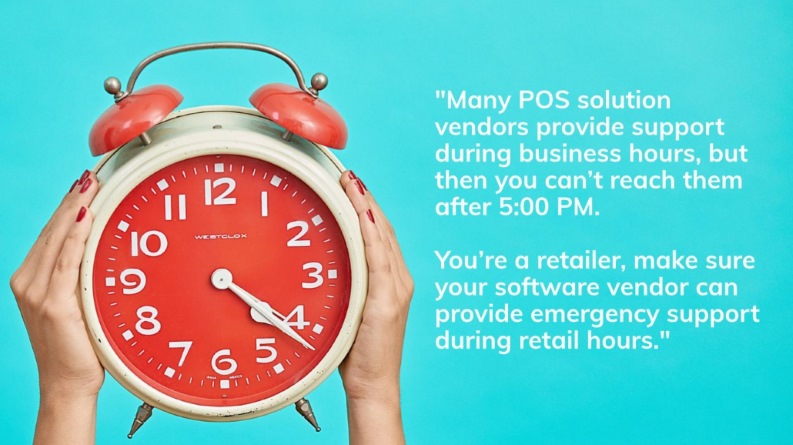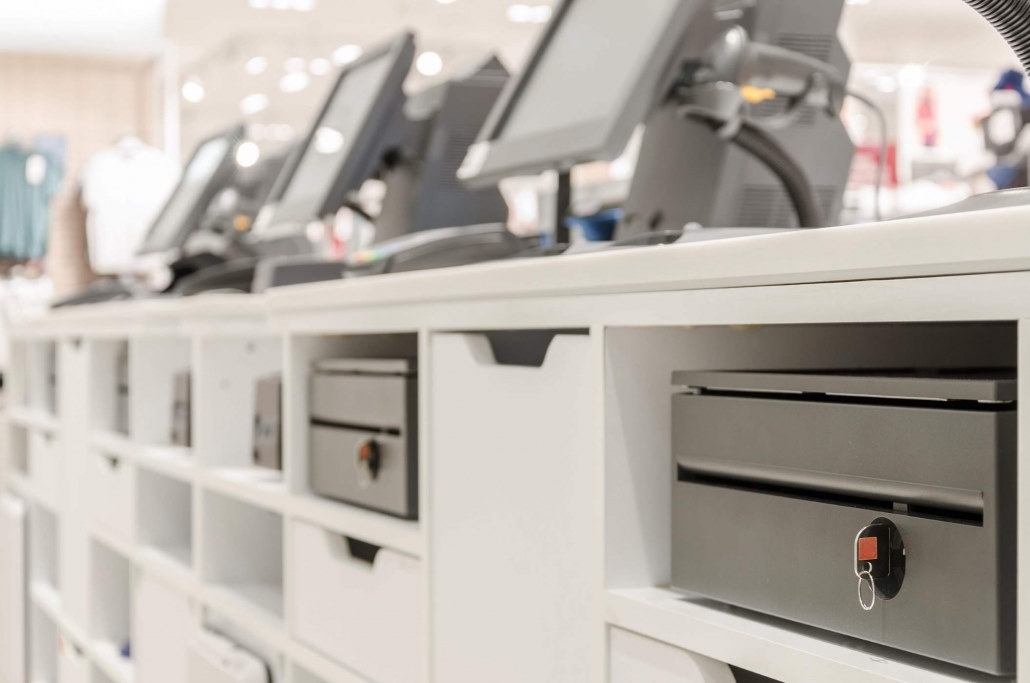7 Things to Consider Before Buying a POS System. Don’t Make These Mistakes
If you’re thinking of purchasing a new POS solution, take note of these seven things to consider when buying a Retail POS System
Waiting too long to buy a POS system
The number one mistake made by a lot of first-time retailers is buying a POS system just a week or two before opening their store. They spend all of their time buying merchandise, managing tradespeople, and hiring employees. However, the important task of purchasing a retail POS system is often left until the last few weeks, or days, before opening. This is a huge mistake because the process of evaluating POS systems, choosing the right one for your business, and then deploying it can take weeks or even months. It’s not a trivial task, it’s a big job and it’s a complicated one. So, start your evaluation as soon as possible; why not right after you sign the lease agreement for your store? You can use the next few months to evaluate systems and find the one that best suits your business and budget. Oh, and make sure you learn how long it will take to order all your hardware components and perform the specific tasks necessary to deploy your system. You don’t want to go through a long evaluation process to find the right system, and then find out that you don’t have enough time to deploy it before you open your store. Your vendor should be able to provide a basic overview of the deployment process, including approximate delivery times of any hardware components, and a list of tasks you will have to complete on your own before you can start using the system. Work with your vendor to create a realistic installation and training schedule that will ensure your POS system and your employees will be ready to go when your store opening day arrives.
Buying the POS hardware before the software
Don’t buy your POS hardware before you choose your POS software. It’s like putting the cart before the horse and it’s one of the biggest mistakes that new retailers make when investing in a new POS system. It is always better to evaluate software solutions first. Choose the software that fits your business environment and budget, then choose a POS hardware vendor that works best with the software. Plus, your software vendor will be able to recommend the best hardware vendors for their software. Proving that it’s a bad idea, here are some examples of common predicaments in which retailers find themselves when buying hardware first:
Ways to torpedo your POS Software Selection
- They buy an iPad or Mac because it looks great but then they take all Windows-based apps out of their evaluation. Since the majority of business programs run on Windows software platforms, they can’t find software that is flexible enough for their needs or expandable enough for their growth plans.
- They buy a computer system with a regular monitor, and then they buy a software program that relies heavily on using a touch-screen monitor. Now they have to buy a touch-screen monitor and they have a regular monitor that collects dust and takes up space.
- They buy equipment online such as POS peripherals (receipt printers, cash drawers, barcode scanners, etc.) to find out that they don’t match the ports on their computer.
Not evaluating the POS hardware vendor
Many retailers purchase hardware on the internet with no regard for the company supplying the products. Unless you have prior experience with their products and services, evaluating the vendor is a must. What retail-specific experience do they have? What are their warranty programs and how do they handle repairs and replacements? If they are an online vendor, where is their repair depot? Who bears the cost of shipping warranty repairs to and from the repair depot? How easy is it to access support after hours and on weekends? Talk to each vendor and learn what support services they offer to complement the products they sell. It usually makes sense to pay a bit more for hardware if the vendor can provide value-added services, like Next-Business-Day swap-outs, or technical assistance with device drivers and operating system upgrades. A knowledgeable vendor will also assist you in comparing different products and ultimately choosing the specific models that will work best in your environment and with your software application.
Not evaluating the POS System vendor with enough scrutiny
The software vendor you choose is as important as the software itself. Many retailers buy their POS solutions solely based on functionality and price, without any regard for who is selling them the software. Ask yourself, does the vendor have a lot of experience selling to retailers in my market? An experienced vendor who has deployed systems for a lot of similar retailers can help you learn the software faster and provide a lot of tips and tricks that will save you time and money. In addition, most POS software vendors are familiar with their competitors’ products and can speak to key differences in their offerings. This will help you compare apples to apples more easily. What about the professional support services offered by the vendor? Can you sign up for one-on-one training programs or do you have to teach yourself how to use their software, relying on online tutorials or user manuals? These are great tools as occasional reference materials, but they don’t compare to the benefits you’ll get when you’re trained by an experienced software expert who can personalize your training program and offer guidance and knowledge throughout the deployment process. What about after your system is deployed and you are actually using the software in your business; do you have access to end-user support when you need it? Many POS solution vendors provide support during business hours, but then you can’t reach them after 5:00 PM. If you’re a retailer, make sure your software vendor can provide emergency support during retail hours.

Not evaluating enough POS software programs
Don’t just purchase the first POS software program you evaluate; or the cheapest program on the market. Not all POS software is created equal. There are many point-of-sale systems that only provide very basic features and functions; and many that have hidden costs that you won’t know about until after you fork over your credit card info. By evaluating multiple retail systems, you can compare the features and costs of each and come to a more informed decision. You don’t need to evaluate every POS software program on the market but you should see demonstrations of at least two or three before choosing one for your business.
Evaluating too many POS software programs
After Mistake # 5, it might seem counter-productive to say this but sometimes you can evaluate too many solutions. After a while, you experience “information overload’ and start mixing up which solutions provide which features. When this happens, it’s not uncommon for people to start their evaluation over from scratch – or just choose the first (or last) or cheapest solution and hope for the best. It’s okay to reach out to a lot of vendors and POS solution providers for your initial introductory calls or discussions, but distill your list down to two or three vendors that can give you detailed demonstrations of their solutions. You’ll be able to compare better and you won’t waste your time (and other people’s time) running around in circles trying to remember which products provided which features.
Choosing a Merchant Services Provider before buying your POS system
Another mistake retailers make when purchasing their first POS system is choosing the company that will process credit cards and debit cards for them before they buy their POS system. Since banks offer a wide variety of merchant services, including credit/debit card processing services, they will always try to sign you up for their merchant services offerings when you set up your bank account. But it’s premature to do it before you buy your POS system because if you want your system to integrate into your Merchant Services Provider’s host processor, you will need to choose a POS system that has already been certified by your Merchant Services Provider. Most POS systems are integrated into multiple Merchant Services Providers, but not necessarily to the one your bank promotes. So if you want the benefits of having an integrated card payment solution, make sure you choose your POS system first; then ask your POS vendor which Merchant Services providers they support; and negotiate a contract with one of them.

